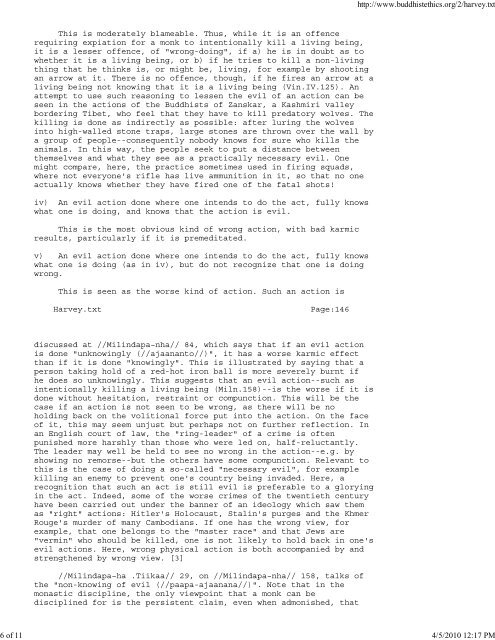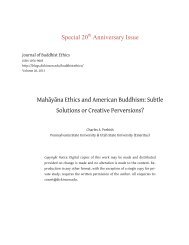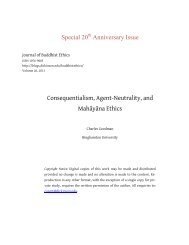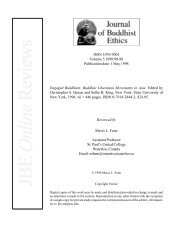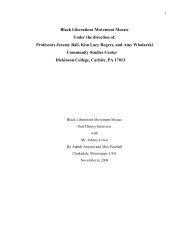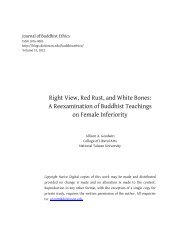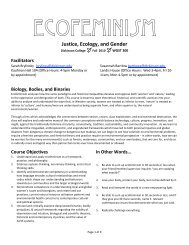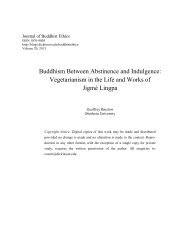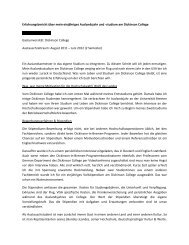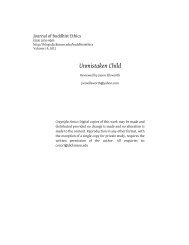Read article - Dickinson Blogs
Read article - Dickinson Blogs
Read article - Dickinson Blogs
You also want an ePaper? Increase the reach of your titles
YUMPU automatically turns print PDFs into web optimized ePapers that Google loves.
This is moderately blameable. Thus, while it is an offence<br />
requiring expiation for a monk to intentionally kill a living being,<br />
it is a lesser offence, of "wrong-doing", if a) he is in doubt as to<br />
whether it is a living being, or b) if he tries to kill a non-living<br />
thing that he thinks is, or might be, living, for example by shooting<br />
an arrow at it. There is no offence, though, if he fires an arrow at a<br />
living being not knowing that it is a living being (Vin.IV.125). An<br />
attempt to use such reasoning to lessen the evil of an action can be<br />
seen in the actions of the Buddhists of Zanskar, a Kashmiri valley<br />
bordering Tibet, who feel that they have to kill predatory wolves. The<br />
killing is done as indirectly as possible: after luring the wolves<br />
into high-walled stone traps, large stones are thrown over the wall by<br />
a group of people--consequently nobody knows for sure who kills the<br />
animals. In this way, the people seek to put a distance between<br />
themselves and what they see as a practically necessary evil. One<br />
might compare, here, the practice sometimes used in firing squads,<br />
where not everyone's rifle has live ammunition in it, so that no one<br />
actually knows whether they have fired one of the fatal shots!<br />
iv) An evil action done where one intends to do the act, fully knows<br />
what one is doing, and knows that the action is evil.<br />
This is the most obvious kind of wrong action, with bad karmic<br />
results, particularly if it is premeditated.<br />
v) An evil action done where one intends to do the act, fully knows<br />
what one is doing (as in iv), but do not recognize that one is doing<br />
wrong.<br />
This is seen as the worse kind of action. Such an action is<br />
Harvey.txt Page:146<br />
discussed at //Milindapa~nha// 84, which says that if an evil action<br />
is done "unknowingly (//ajaananto//)", it has a worse karmic effect<br />
than if it is done "knowingly". This is illustrated by saying that a<br />
person taking hold of a red-hot iron ball is more severely burnt if<br />
he does so unknowingly. This suggests that an evil action--such as<br />
intentionally killing a living being (Miln.158)--is the worse if it is<br />
done without hesitation, restraint or compunction. This will be the<br />
case if an action is not seen to be wrong, as there will be no<br />
holding back on the volitional force put into the action. On the face<br />
of it, this may seem unjust but perhaps not on further reflection. In<br />
an English court of law, the "ring-leader" of a crime is often<br />
punished more harshly than those who were led on, half-reluctantly.<br />
The leader may well be held to see no wrong in the action--e.g. by<br />
showing no remorse--but the others have some compunction. Relevant to<br />
this is the case of doing a so-called "necessary evil", for example<br />
killing an enemy to prevent one's country being invaded. Here, a<br />
recognition that such an act is still evil is preferable to a glorying<br />
in the act. Indeed, some of the worse crimes of the twentieth century<br />
have been carried out under the banner of an ideology which saw them<br />
as "right" actions: Hitler's Holocaust, Stalin's purges and the Khmer<br />
Rouge's murder of many Cambodians. If one has the wrong view, for<br />
example, that one belongs to the "master race" and that Jews are<br />
"vermin" who should be killed, one is not likely to hold back in one's<br />
evil actions. Here, wrong physical action is both accompanied by and<br />
strengthened by wrong view. [3]<br />
//Milindapa~ha .Tiikaa// 29, on //Milindapa~nha// 158, talks of<br />
the "non-knowing of evil (//paapa-ajaanana//)". Note that in the<br />
monastic discipline, the only viewpoint that a monk can be<br />
disciplined for is the persistent claim, even when admonished, that<br />
http://www.buddhistethics.org/2/harvey.txt<br />
6 of 11 4/5/2010 12:17 PM


